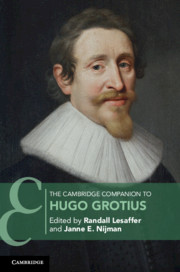Book contents
- The Cambridge Companion to Hugo Grotius
- Cambridge Companions to Law
- The Cambridge Companion to Hugo Grotius
- Copyright page
- Contents
- Contributors
- Preface
- Chronology
- Abbreviations and Short Titles of Works by Grotius
- Editions and Translations of Grotius’ Work
- Introduction
- Part I Grotius in Context
- Part II Concepts
- 4 Virtue
- 5 Trust (Fides)
- 6 Natural Law as True Law
- 7 Sociability
- 8 Sovereignty
- 9 Church and State
- 10 Predestination
- 11 Rights (I)
- 12 Rights (II)
- 13 Property, Trade and Empire
- Part III Grotius as a Man of Letters, Theologian and Political Writer
- Part IV Grotius as a Legal Scholar
- Part V The Reception of Grotius
- Index
- References
13 - Property, Trade and Empire
from Part II - Concepts
Published online by Cambridge University Press: 03 September 2021
- The Cambridge Companion to Hugo Grotius
- Cambridge Companions to Law
- The Cambridge Companion to Hugo Grotius
- Copyright page
- Contents
- Contributors
- Preface
- Chronology
- Abbreviations and Short Titles of Works by Grotius
- Editions and Translations of Grotius’ Work
- Introduction
- Part I Grotius in Context
- Part II Concepts
- 4 Virtue
- 5 Trust (Fides)
- 6 Natural Law as True Law
- 7 Sociability
- 8 Sovereignty
- 9 Church and State
- 10 Predestination
- 11 Rights (I)
- 12 Rights (II)
- 13 Property, Trade and Empire
- Part III Grotius as a Man of Letters, Theologian and Political Writer
- Part IV Grotius as a Legal Scholar
- Part V The Reception of Grotius
- Index
- References
Summary
Grotius recast Aristotelian theories of human sociability in terms of self-preservation.Religious war in Europe had undermined the Thomist notion of mutual human affection as a basis for society.If society was established by the need to survive, then justice, which maintained society, must be understood in terms of its contribution to that necessity.Grotius therefore resolved the Ancient Roman and Greek problem of how to reconcile justice and expedience by reinterpreting justice in terms of expedience.For an individual, or state, to act out of self-preservation was necessarily just.His fusion of justice and expedience was one reason he was insistent upon distancing his thought from the Academic Sceptics, such as Carneades, who argued that there was no such thing as justice and that all moral action was expedient.For Grotius, part of the law of self-preservation was the necessity for individuals to secure the means for self-preservation and this meant that the acquisition of property, and trade, were central parts of that process.These principles applied also to the artificial person of the state which found itself in competition for survival with other states.The expansion of the state was therefore justifiable for its preservation.Indeed, following this reasoning, empire effectively became a necessity, and an inevitability, for the survival of European states.
Keywords
- Type
- Chapter
- Information
- The Cambridge Companion to Hugo Grotius , pp. 275 - 290Publisher: Cambridge University PressPrint publication year: 2021
References
Further Reading
- 1
- Cited by

